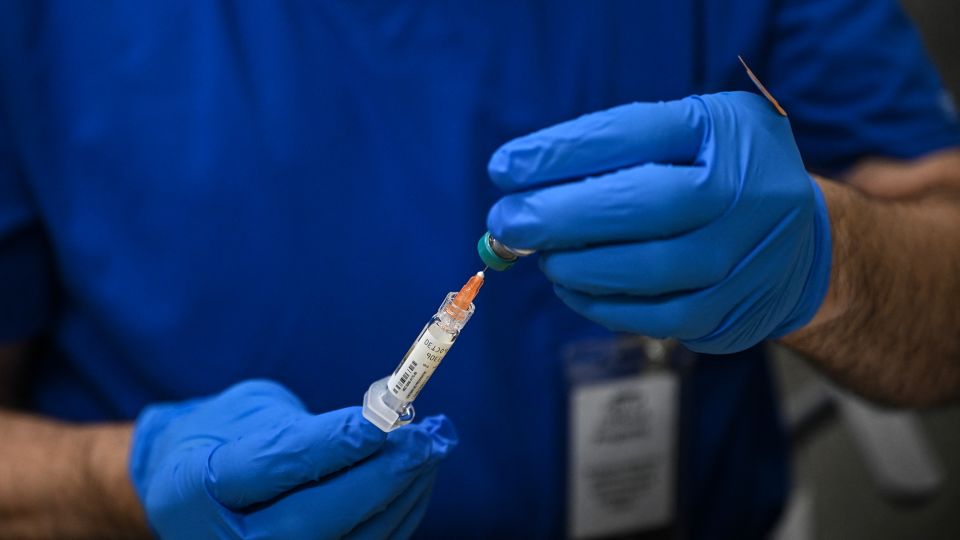Measles have surged to a record high, with more cases reported this year than any year since the disease was declared eliminated in the United States in 2000.
This disappointing record comes amid falling childhood vaccination rates: Coverage against measles, mumps, rubella, chickenpox, polio and pertussis is declining in more than 30 states, according to data from the US Centers for Disease Control and Prevention.
Some people may believe that if they’re personally vaccinated, they have nothing to worry about. But is individual protection enough when contagious illnesses start multiplying? How will falling vaccination rates result in the return of previously eliminated diseases? Will only children be affected, or could adults see an impact as well? Who would be at highest risk if there is lower population-wide immunity? And what can be done to prevent this possibility?
To get some answers, I spoke with CNN wellness expert Dr. Leana Wen. Wen is an emergency physician and clinical associate professor at George Washington University. She previously was Baltimore’s health commissioner.
CNN: Can falling vaccination rates result in the return of diseases that have been eliminated?
Dr. Leana Wen: Yes. There are numerous examples around the world. Countries that were once polio-free have had polio outbreaks due to interruptions in childhood immunization programs caused by war and conflict. Measles outbreaks have occurred in countries where measles had been eliminated, due to falling vaccine coverage.
This, in fact, is what we are seeing now in the US. In Texas, 753 measles cases have been confirmed since January. According to the Texas Department of State Health Services, 98 of these patients have been hospitalized, and two people, both children, have died. This outbreak is believed to have originated in communities with low vaccination rates.
What could happen if childhood vaccination rates declined further? A recent study published in JAMA predicted that a 10% decline in measles-mumps-rubella (MMR) vaccine coverage could result in more than 11 million measles infections over 25 years. A 50% decline in routine childhood vaccinations could result in 51 million measles cases, 9.9 million rubella cases and 4.3 million polio cases.
The projections also included the number of people affected by severe consequences of these diseases: As many as 10.3 million people in the US could be hospitalized, 159,200 could die, 5,400 could experience paralysis from polio, and 51,200 could have neurological consequences from measles.
CNN: Is that only unvaccinated people? If someone is vaccinated, do they need to worry if others are unvaccinated?
Wen: They should still worry for three main reasons.
First, while many vaccinations provide excellent protection against disease, there is still a chance of breakthrough infections — meaning that the vaccine doesn’t provide 100% protection. Two doses of the MMR vaccine are 97% protective against measles infection, which is an outstanding level of protection. But it’s not 100%, so if someone is exposed to measles, there is still a chance they could become infected. However, vaccination substantially reduces the likelihood of infection and also of having severe disease if they were to become infected. The more disease there is in the community, the higher the likelihood of exposure and infection.
Second, there may be some waning of vaccine effectiveness over time. For instance, according to the CDC, immunity to pertussis — also known as whooping cough — starts to wane after a few years following vaccination. Older adults who received childhood vaccinations many years ago may become susceptible if previously controlled childhood diseases make a comeback.
Third, there are people who are unable to receive the benefit of vaccination directly themselves. Some people are unable to receive certain vaccines because of specific medical conditions. For instance, someone who has a weakened immune system may not be able to get the MMR vaccine because it contains a live, weakened form of the virus.
Also, some people may have medical conditions that render vaccines less effective at protecting them. These individuals depend on the rest of society — those who can receive the vaccine — to do so and try to prevent these diseases from spreading.
CNN: What about pregnant people? Are there also some vaccines they cannot get?
Wen: This is another good point. Take rubella, or German measles. Pregnant individuals cannot receive the MMR vaccine because it contains live virus. But rubella can be especially dangerous during pregnancy.
In addition to increasing the risk of miscarriage and stillbirth, rubella can lead to a condition called congenital rubella syndrome that can cause numerous birth defects including heart problems, brain damage, deafness, and lung, liver, eye and thyroid ailments. According to the World Health Organization, before the introduction of the vaccine, as many as 4 babies in every 1,000 live births were born with this condition. Rubella remains the leading cause of vaccine-preventable birth defects.
Pregnant patients should not receive other live-attenuated vaccines either. Varicella, the vaccine against chickenpox, is another one of these vaccines. People should receive the vaccines before they are pregnant, ideally as part of their routine childhood immunizations. And other people can help to reduce disease in the community by getting vaccinated themselves.
CNN: Who would be at highest risk if there is lower population-wide immunity?
Wen: There are three groups I would be the most worried about. First are newborns who are too young to be vaccinated. They are also among the most medically fragile; something that is a mild cold for an older child or healthy adult could send them to the hospital.
Second are immunocompromised people. This is a large group and includes patients receiving cancer treatments, transplant patients and individuals taking immunosuppressant medications. These individuals are more likely to become severely ill if exposed to disease. Vaccines may also not protect them as well, or they may be ineligible to receive certain vaccines as we discussed earlier.
Third are the elderly. As we discussed many times in reference to Covid-19, these are individuals whose age and underlying medical conditions make them more susceptible to severe illness. That, in combination with possible waning immunity from certain vaccines, could put them at higher risk if there is more disease in the community because of lower vaccine coverage.
CNN: What can be done to prevent this possibility?
Wen: Everyone should speak with their primary care provider to verify that they are up to date on recommended vaccines. Parents with young children should do this with their family’s pediatrician, and adults should also be sure to speak with their family physician or internist as well.
The reason to do this is primarily to ensure that you are well-protected. If you are eligible for additional booster doses, you may consider getting them, or, if you are more susceptible to certain illnesses because you are not eligible for some vaccines, you should also know this and take precautions accordingly.
There’s another reason: The entire concept of population immunity depends on all of us doing our part to keep diseases at bay. That protects us — and others around us, including those who are especially vulnerable to severe illness and death.
For more CNN news and newsletters create an account at CNN.com
The post The diseases that could return as vaccination rates decline — and why you should care appeared first on CNN.



